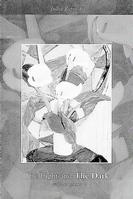
The Light and The Dark: collected poems
By Jullia Rypinski.
Kingston, Jamaica: The Mill Press, 2003. 175 pages.
I never knew how hard it was to live
until I pondered how to die.
I'm leaving shortly for the future,
travelling - oh, so light! - this time.
('Advice Not Taken')
Of Polish and Hungarian extraction, Jullia Rypinski (1911-2004) wrote with verve, style, and a wonderfully deep humility about the stages of life and the coming of death. In this she was similar at times to Emily Dickinson, for both these poets wrote of death with intimacy, as one would of a lover. Jullia Rypinski borrowed many dramatic aspects from the stage, her first love, and applied it to the writing craft that she discovered and worked at assiduously in her advanced years. Her daughter Valerie Facey states: 'In the winter of her years, coming to the perennial summer of Jamaica was a paradox of cultural disparity. Yet it was in the country of her refuge that, with a fresh palette and a new script, unencumbered by past demons, she embarked on the most productive and satisfying decade of her life'. Rypinski had turned to writing poems with a dedication and deep gratitude that anchored her in the final years of her life.
The Light and The Dark is a collection of Rypinski's two earlier books of poetry, The Love-Parting (1999) and In the Twilight (2002), and some 21 subsequent poems written up to the time, in October 2002, when at the age of 91 Rypinsky wrote her last poem. That she wrote with élan and style into her 90s is reminiscent of Jean Rhys, as is the comfort Rypinski took from writing and her delight in weaving words around both her everyday experience and her drive to make an accounting of her long life. Rypinski's poems show a spiritual arc of growth from her first poems as a young girl (published in The Love-Parting) through the poems that record queries about life's changes (collected in In The Twilight) to her final ascetic offerings in 'Last Poems'. Her life and her loves are accounted for, and a peace achieved for the poet at the end of the long struggle to find meaning and order. In 'Changes of Life', the poet says:
Now I've started to love myself. That's new
for me because I always hated me.
And now, loving myself, I wish to die,
having had enough of love and mortality.
Jullia Rypinski had a 'long, eventful and gypsyish life' in the course of which she moved house more than 60 times. Her main concerns were the professional stage, her three husbands (the last of whom died in 1990), her daughters, and the dream of falling in love. Young at heart, Rypinsky came to find that something more was needed to fill the life of a woman who'd survived, mentally intact, into her mid-80s. She craved intimacy and spiritual fulfilment, both of which she found in the act of honing her poet's craft. In 'Slipping Away', she writes:
Can we be sure of anything at all
considering the falsity that stalks
our every hour? If there were Truth about
a clearer air would give us less to doubt.
And in 'Lessons', she shares the burden of her hard-won knowledge:
It's good to know humility,
greatest of all subordination,
is the final step to mastery.
Rypinski is speaking of mastery of self and craft. She has journeyed far from the young girl who at fifteen sang:
The number of years till I'm
twenty-one,
The dozens of cousins I've always at hand,
And lots of things thought of when going to sleep
That no one but me could or would understand.
Rypinski's involvement with the approach of death is intense, sometimes fearful, but most often devolving into an acceptance that restores her courage and rounds out her poetry with profound spirituality. In 'Marvel', she writes:
I take the challenge every time - the blow,
the disappointment - for instinctively I fight.
I came to life from where I do not
know
and death will show me where I have to go.
Rypinsky moved from Italy to Jamaica on the death of her third husband and began giving poetry the focused attention that her talent merited. In 1998, she was a Gold Medal awardee in the JCDC festival poetry competition, and her first collection of poems won the Book Publishers' Industry Association Award for Best Adult Creative Writing. It is with pleasure that the reader can find all her poems collected within two covers as The Light and The Dark, along with her final poems.
Rypinski's mentor and teacher, Wayne Brown, has noted that there is a 'transcendent affirmation' in Rypinski's last poem (which gives the collection its name):
I go to the light with assurance; I can see!
I close my eyes and wander through that rare variety.
Brown observes that the essential light is inward, as are the riches, the 'rare variety' of the world. These are fitting last words of a poet who affirms in the end 'the sovereignty of Mind'. She has worked arduously and carefully to arrive at this conclusion. Paradoxically, she is the same poet who affirms also the ennobling attitudes that inhere in the craft of poetry itself ('A Fine Art'), and the struggle to find, in the world, a lasting love that is flesh:
Then came the lovers and the husbands, mad
For me a year, a month, a week, a day -
Then mad at me. Then, lastly, there was the love
I finally had, and in my thoughts embalmed,
The only love I ever kept: safe, entombed.
('Loves Lost and Found')
Rypinski came to writing serious poetry late in life, but it was the love that transcended, and it gave her life. That love of the craft blessed her final years and rewarded her deeply - as it continues to reward us, her readers - for her effort and her gratitude.

